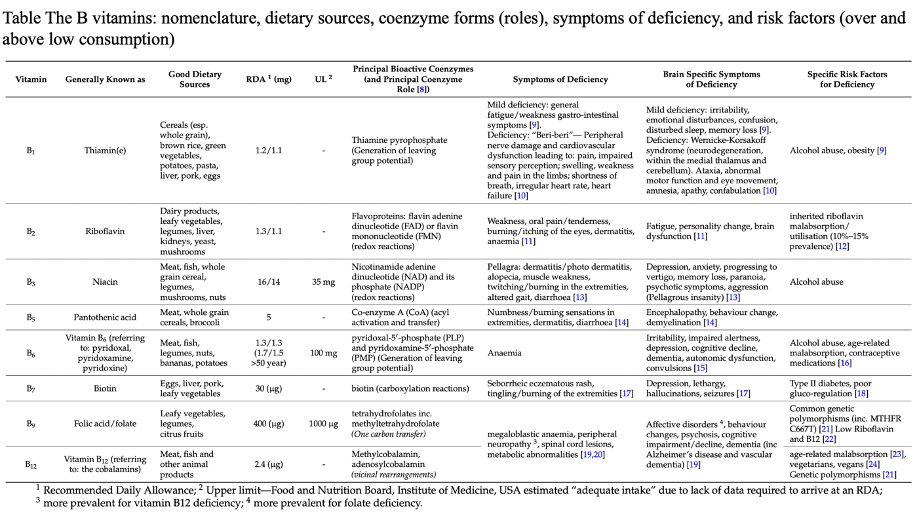The B vitamins comprise a group of eight water-soluble vitamins (shown in the table below): thiamine (B1), riboflavin (B2), niacin (B3), pantothenic acid (B5), pyridoxine (B6), biotin (B7), folate (B9), and cobalamin (B12). They play important and closely inter-related roles in cellular functioning and play a myriad of cofactor roles in human metabolism, acting as coenzymes in a large number of catabolic and anabolic enzymatic reactions. Their collective role is particularly important for many aspects of brain function, including energy production, DNA and RNA synthesis and repair, genomic and non-genomic methylation, and the synthesis of numerous neurochemicals and signaling molecules. Given the importance of B vitamins in neurodevelopment and nervous system functioning, B vitamin deficiency is a major cause of neurological impairment and disability worldwide. Therefore, adequate levels of all members of the B vitamins are essential for optimal physiological and neurological functioning.
In addition, there are also studies suggesting that B vitamins or omega-3 polyunsaturated fatty acids may deter the development of cardiovascular disease. The limited evidence from intervention studies suggests that combined supplementation with B vitamins and omega-3 polyunsaturated fatty acids may be more promising and effective in reducing plasma homocysteine, triglyceride, and low-density lipoprotein cholesterol than supplementation with each substance alone.
Taken together, supplementation with the entire B vitamins is a more rational approach than selecting one, two, or three compounds from this subgroup of vitamins.

Rahman, S., & Baumgartner, M. (2019). B Vitamins: Small molecules, big effects. Journal of inherited metabolic disease, 42(4), 579-580. [Link]
Kennedy, D. O. (2016). B vitamins and the brain: mechanisms, dose and efficacy—a review. Nutrients, 8(2), 68. [Link]
Zhu, J., Xun, P. C., Kolencik, M., Yang, K. F., Fly, A. D., & Kahe, K. (2022). Do B Vitamins Enhance the Effect of Omega-3 Polyunsaturated Fatty Acids on Cardiovascular Diseases? A Systematic Review of Clinical Trials. Nutrients, 14(8), 1608. [Link]
